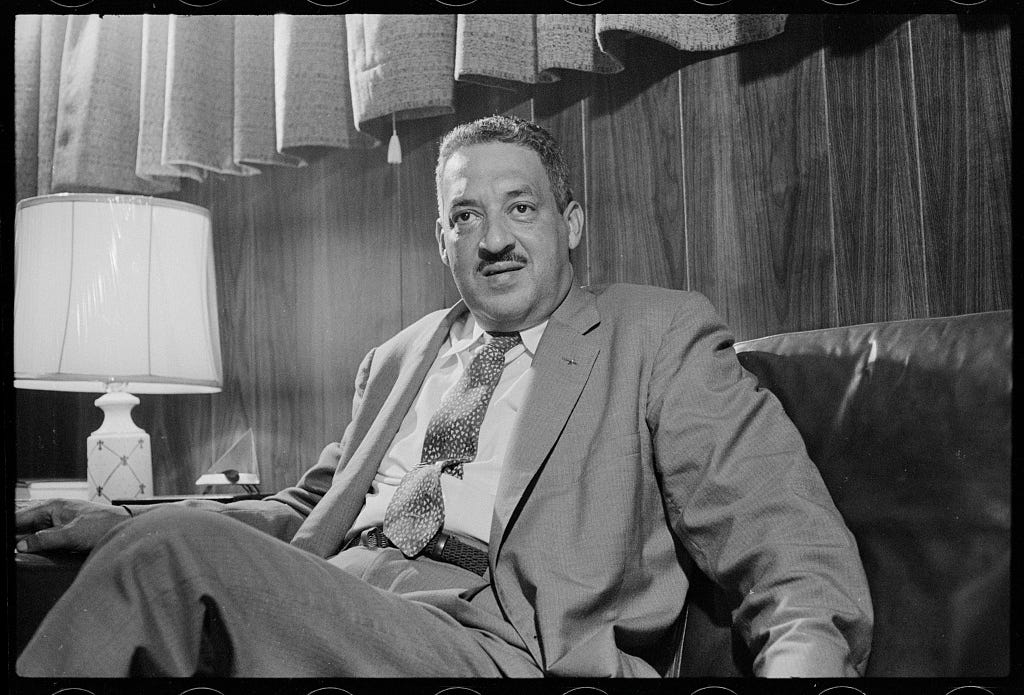When Justice Thurgood Marshall Was a Shabbos Goy
Plus some longreads and listening for your weekend

As you may know, Sabbath-observant Jews are forbidden from working on the holy day, and this prohibition extends beyond manual labor to using things like electricity. Unsurprisingly, this can create problems, and not just when you are running for vice president of the United States. What happens if the lights go off—or if the air conditioning needs to be turned on during a heat wave? The traditional solution to these problems has been the so-called shabbos goy—a generous gentile who performs these tasks when observant Jews cannot.
Today, the shabbos goy is in the news again due to the recent passing of former Secretary of State Colin Powell. Growing up in the Bronx, the future four-star general not only served as a shabbos goy for the local Jewish community, but picked up some fluency in Yiddish. Reflecting on this act of kindness today in Tablet, Supreme Court litigator Nathan Lewin recalled another national icon who shared a similar interfaith experience.
Back in 1965, Lewin was serving in the U.S. Solicitor General’s office when President Lyndon Johnson appointed the celebrated Black jurist Thurgood Marshall to the post. (Marshall, of course, would go on to become the first African-American Supreme Court Justice.) Lewin was soon tasked with introducing himself—and his unusual religious practices—to his new boss. He recounts:
I began by telling Marshall that I was an Orthodox Jew who observed the Sabbath. Since the holidays were approaching, I thought I had better mention those, too. So I continued, “In addition to Saturdays, I can’t work on the Jewish holidays, and they are coming soon. First there is the Jewish New Year, Rosh Hashana, and then comes the holiest day of the year, Yom Kippur.”
At this point, the judge interrupted. “Yes, and then there’s Sukkot, Shemini Atzeret, and Simchat Torah.” I almost fell over. “That’s right,” I said, and added, “But how do you know that?”
“Easy,” Marshall replied, “I grew up in a Jewish neighborhood in Baltimore. In fact, I made some money by turning off lights in homes there on Friday nights.”
Read the whole thing to learn how Marshall’s experience with the Jewish community explicitly influenced one of his rulings on religious liberty.
Elsewhere…
My friend, Washington Post columnist, and noted newsletter subscriber Jake McAuley recently published a book about the fate of Jewish art collectors in France during the Holocaust. This may not sound like gripping reading, but I assure you that this arresting excerpt of the book—about “how France betrayed the very Jews who placed their faith and fortunes in its ideals and culture”—will change your mind. You can read the excerpt here and buy The House of Fragile Things here.
In the New Journal at Yale, Zachary Groz chronicles the remarkable tale of what happened in 1976 when Yale discovered that it had been harboring a Nazi on its faculty.
A Song For Shabbat
By my lights, singer-songwriter Josh Washawsky has been quietly crafting some of today’s most intriguing new Jewish music. His pre-pandemic album, Chaverai Nevarech, was actually an inspiration for some of my own compositions. This week, he quietly released seven more songs, all drawn from the sabbath liturgy. You can find it wherever you get your music, and listen to the first track—Yedid Nefesh—below:
Shabbat shalom,
Yair



